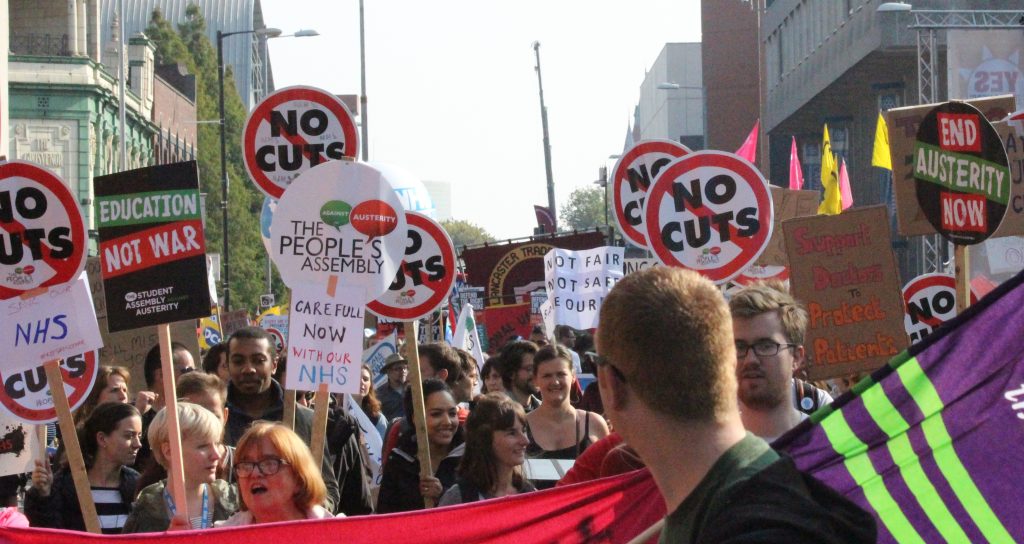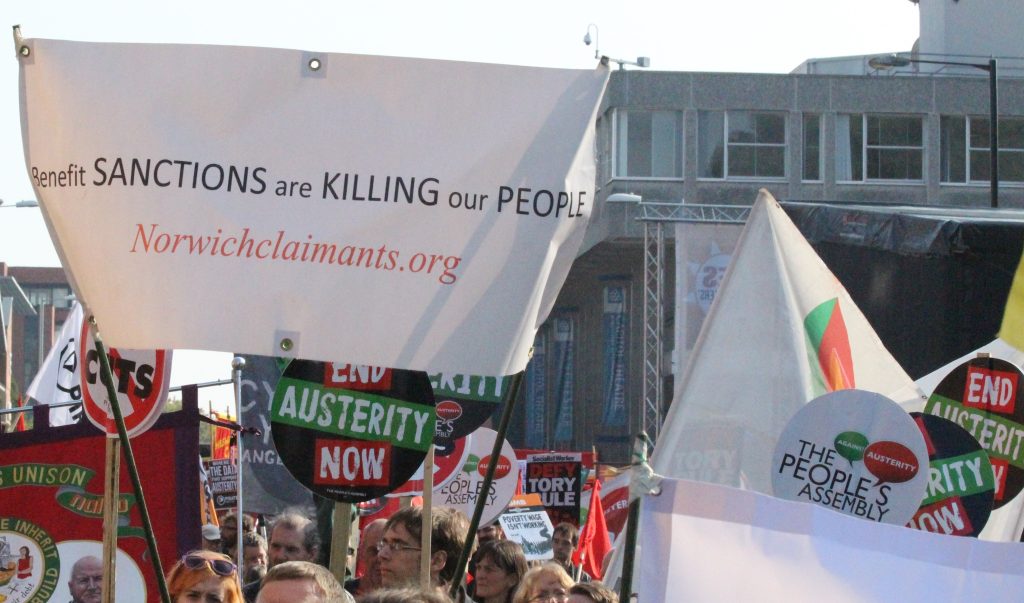April 2025 SPEAK Easter/ May Day Pray and Post 2025

Austerity 2.0 – We’ve been here before By John Ranson
This edition of Pray & Post concerns the state of the UK economy and decisions the current government is taking, which it claims will make us all better off but which seem destined to cause hardship and misery for very many people. It’s rather UK-focussed but the UK certainly isn’t the only country facing such difficulties. If you’re based elsewhere, the chances are you may recognise some of these issues in your own situation.
‘Austerity’ as a general term means living frugally to get through hard times. As a political / economic concept, it means a country making cuts to public spending in order to try and reduce national debt. The word came to prominence in the aftermath of the financial crisis of 2007-8 and particularly with regard to UK government policy from 2010. There were widespread cuts to public services and attempts to lower spending on welfare. Youth clubs vanished, student fees shot up, libraries were threatened with closure, wages stagnated and claiming benefits became a deliberately punishing nightmare of conditionality and sanctions, as well as capricious assessments.
There was some resistance. New protest groupings arose, with students and disabled people often leading the way. Along with single-issue campaigns defending local community assets, there were broader coalitions and groups questioning the tax system and the wider financial world as well as seeking to safeguard the National Health Service. A change in the balance of power at Westminster hasn’t brought much solace for anyone hoping for a change from years of debilitating austerity, with the new government’s most eye-catching policy choices so far including keeping the two child benefit cap, cutting the winter fuel payment for 10 million pensioners, and taking an axe to what remains of the benefits system. (It’s also, disgracefully, continued UK support for Israel’s genocidal assault on Gaza.)
So the UK is suffering from Austerity 2.0. As in 2010, the government is claiming that there’s not enough money and therefore it must spend as little as possible. It was self-defeating nonsense then and it’s self-defeating nonsense now. Even based on its own assumptions, austerity hasn’t worked. The UK’s national debt has increased dramatically in the period since 2010. But as economist Richard Murphy has long pointed out, trying to eliminate the debt, as if it were a maxed-out credit card, is an unnecessary exercise anyway. What austerity has achieved, and is continuing to achieve, is a reduction in the UK’s level of both public services and social security. It’s led to the accusation, echoed even from mainstream media commentators, that the government is “trying to balance the books on the backs of the poorest”.
A study published by the British Medical Journal found that over 330,000 excess deaths between 2012-2019 could be attributed to austerity policies. There’s no reason to expect Austerity 2.0 to be less harmful. The government persistently claims that economic growth is the way to make everyone better off but there are several problems with this. Firstly, several of the proposals, such as airport expansion and rolling back planning regulations, are totally at odds with the government’s own commitments to maintaining a liveable world. Secondly, any small rise in GDP caused by ignoring bats or putting more planes in the air is likely to be swallowed up by global factors such as Brexit, several wars, and now Donald Trump’s chaotic attempt to bully the world with trade tariffs. It’s already the case that meagre increases to benefits aren’t keeping pace with the cost of living.
There’s actually plenty of money in the UK, but it’s ludicrously distributed. While average earners are taking home less in real terms than a generation ago, top footballers are getting the equivalent of an executive annual salary every week. The boss of Bet365 scoops hundreds of millions a year. People can make a fortune on OnlyFans or TikTok. UK billionaire wealth increased by £35 million per day in 2024. It’s against this background that the government is intending to sack civil servants and make it harder for disabled people to access crucial support. There is a compelling case for putting public money directly into the pockets of the less well-off, enabling them to spend directly into the local economy, and in many cases making it easier for them to find suitable work. And much of the public is supportive of a more progressive taxation system, with higher rates for corporations and the super-rich. We could do with getting away from the idea that public spending is funded purely by taxes – if only to lose the nauseating concept of “those with the broadest shoulders”, which serves only to stroke the egos of the wealthy. But while politicians continue to use taxation as their only basis for spending decisions, it clearly needs to be fairer. And that can’t possibly mean squeezing even harder on folks already struggling to scrape by. Both MP Richard Burgon and the Just Money movement are suggesting a very manageable wealth tax of around 2% on assets over £10million. This would generate nearly five times as much as the proposed attack on disabled people. We can’t allow the UK government to get away with blaming benefit claimants for the state of the economy and we have to resist the idea that those in work are paying for others to be idle. Firstly, any decent society should want everybody to be able to live with comfort, security and dignity. Secondly, many people who receive benefits are also in work but because pay is so poor they have to claim a top-up. Also, disabled people’s benefits such as PIP often allow claimants to fund the necessary adjustments to enable them to work. Whether or not we’re directly affected by these proposals, we probably know someone who is and they’re still taking our society in a worrying direction. Austerity was a cruel and
Points for reflection
Our reaction to Austerity may span any number of emotions including anger, despair, sorrow, frustration, rage.
We should be mindful that although politicians often use impersonal language such as ‘balancing the books’, ‘reducing the deficit’ or even ‘living within our means’, the policies of Austerity have very real impacts on many people’s ability to survive, let alone live comfortable and fulfilling lives.
In order to justify cuts to benefits, claimants have frequently been portrayed as undeserving, as skivers, as fraudulent and even as less valuable than ‘working people’. We should seek to oppose this language whenever we hear it and fight against being influenced by such attitudes.
Points for action
Our response may involve protest, campaigning, solidarity support, direct action.
Look out for protests taking place in your area. Disabled People Against Cuts (DPAC) are calling for imminent action. The People’s Assembly has called a Central London rally for June 7th.
The Social Workers Union Austerity Action Group has resources for campaigning against austerity.
The Acorn renters’ union [Facebook page] offers support and practical assistance to people facing housing difficulties.
Consider signing the petition for a wealth tax and supporting Just Money’s similar campaign. You can contact your MP either via Just Money or you can use the template below and send an email or letter to them directly.
Dear MP
I’m concerned by government proposals to pursue what are essentially Austerity policies. Proposed ‘reforms’ to welfare, including a tightening of PIP eligibility are set to make life harder for many people who are already facing severe pressure from previous cuts as well as multiple cost of living factors. Even in simple book-keeping terms, any purported savings from these plans are dwarfed by the amount that could be generated by a modest 2% wealth tax on assets over £10million. There are also promises of wider cuts to government spending.
A study published by the British Medical Journal found that over 330,000 excess deaths between 2012-2019 could be attributed to austerity policies. The government must learn the lessons of the recent past and not allow such suffering again.
Please use every opportunity to speak and vote against Austerity policies and lend your voice to calls for a wealth tax that could go some way to setting our country on a fairer course.
Sources
1. News Article (The Guardian):
Butler, P., 2022. Over 330,000 excess deaths in Great Britain linked to austerity, finds study. The Guardian, [online] 5 October. Available at: https://www.theguardian.com/business/2022/oct/05/over-330000-excess-deaths-in-great-britain-linked-to-austerity-finds-study [Accessed 17 Apr. 2025].
2. Academic Journal Article (Journal of Epidemiology & Community Health):
Walsh, D., Dundas, R., McCartney, G., Gibson, M. and Seaman, R., 2022. Trends in mortality in Scotland and other Western European countries, 1970–2019: an observational study. Journal of Epidemiology & Community Health, [online] 76(12), pp.1027–1033. Available at: https://jech.bmj.com/content/76/12/1027 [Accessed 17 Apr. 2025].
These sources quotes and published by British Medical Journal a trusted UK medical publication.
Other sources are hype-linked within the article above so just click on links thank you!

By John Ranson April 2025

Download the PDF of pray and post here- https://www.dropbox.com/scl/fi/pzmjm19k46lvnvlud7g7s/SPEAK-P-P-Austerity-19-4-2025-v4.pdf?rlkey=u3n5m4szxx087vq61qerabov0&dl=0
